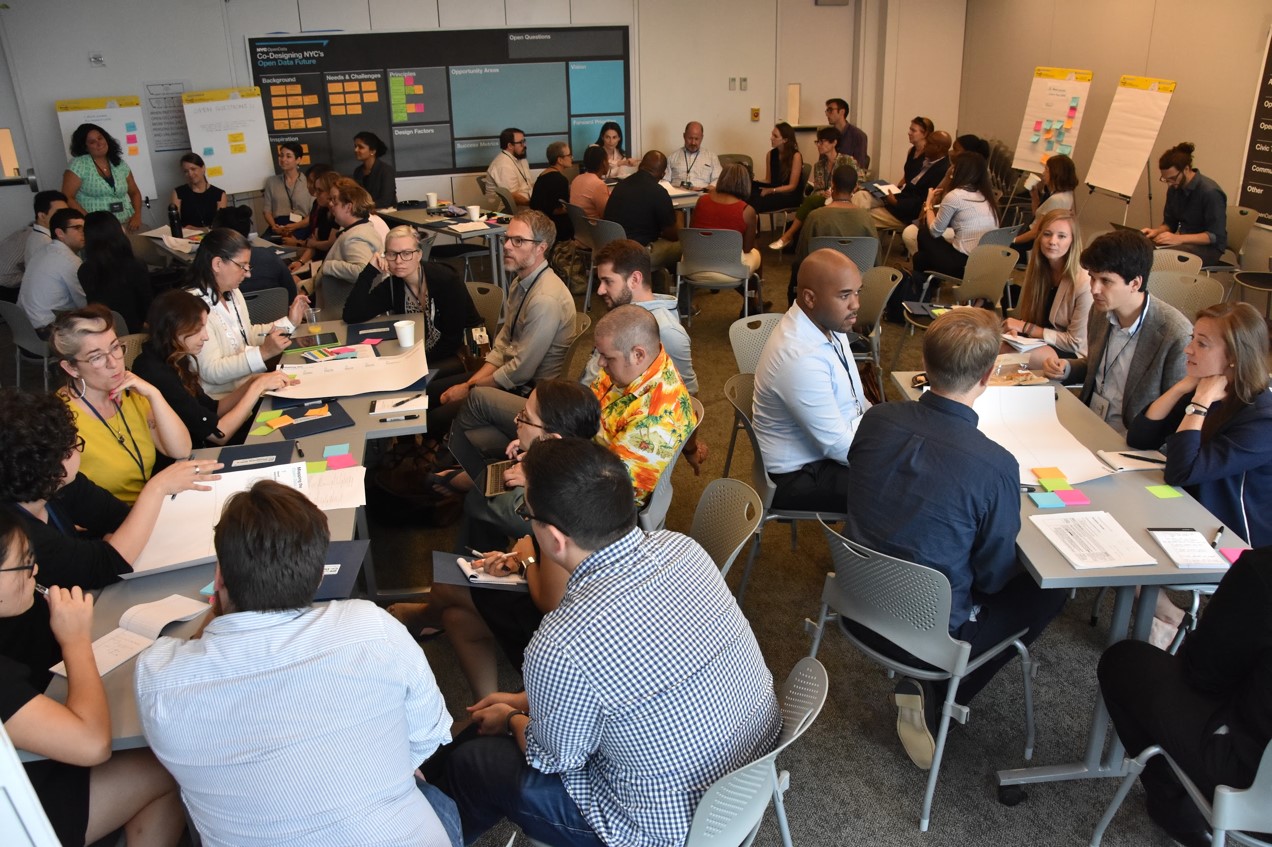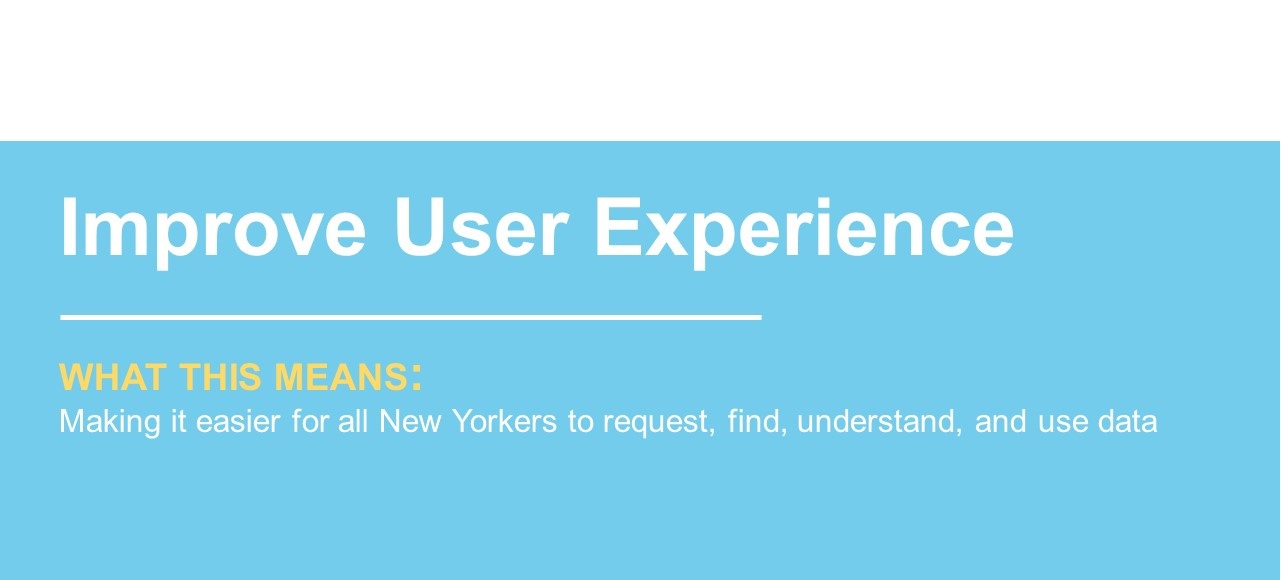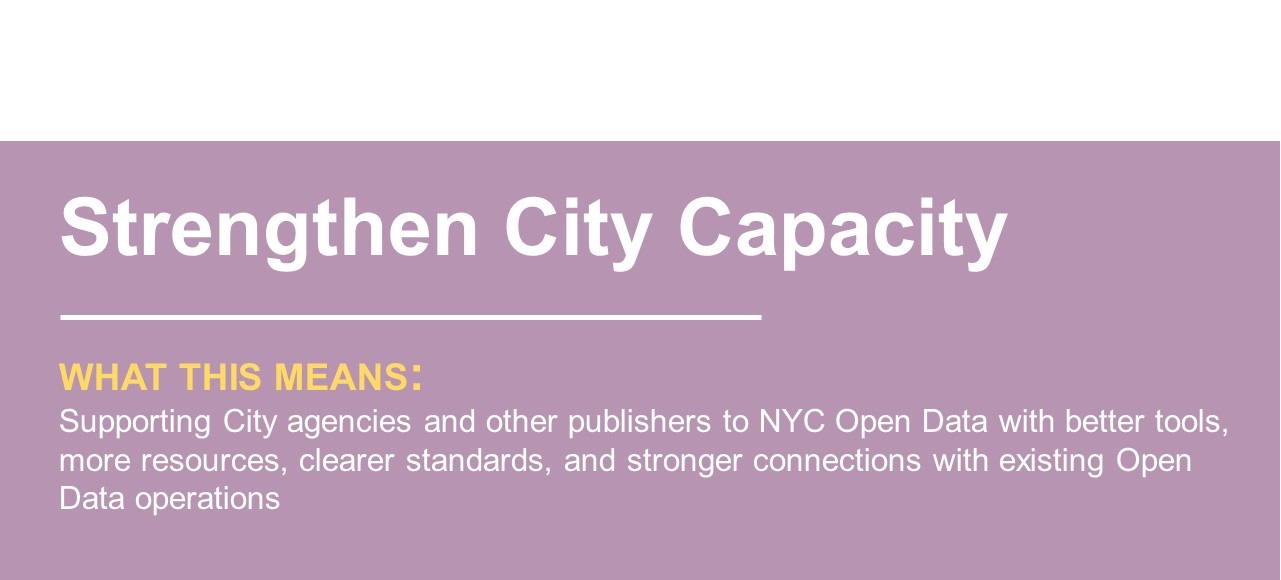
Strategic Plan Update
Two years ago, the Open Data Team brought together City employees, civic hackers, open data evangelists, and good government advocates in a two-day workshop to reflect on the successes and challenges of the first ten years of open data in New York City. During the workshop, the participants co-created a vision for the next decade of NYC Open Data, which the Open Data Team used in tandem with a public survey to write the strategic plan for the next ten years of NYC’s Open Data. This strategic plan encompasses 27 initiatives across three main areas: improving user experience, strengthening the City’s capacity, and building communities.
As part of last year’s report on Open Data, we provided an update on each initiative with highlights on specific areas of progress. While our plans to implement some of these initiatives have shifted in two years time, we are continuing to work on seeing them forward, and what follows is a two-year update on the strategic plan. As with last year, each initiative has a Status Update, and many have “Status Notes” to share more detail on the work that is underway or planned.
Statuses
In progress: Meaningful work has begun on this initiative. In some cases, portions of the initiative are complete while others remain underway. In those cases, additional detail is available in the Status Notes column.
Planning: The Open Data Team has begun to work on the planning and preparatory work necessary for this initiative.
Future: The Open Data Team has not yet started working on this initiative or work is temporarily on hold as other initiatives are moved forward.

| Subcategory | Strategic Initiative | Timeline | 2021 Status | Status Notes |
|---|---|---|---|---|
| Provide a User-Friendly, Dynamic Platform | 1. Explore an open source platform that allows for continuous design, development, piloting, and implementation of new features—while ensuring equitable access to the underlying code for this public service | Long-term | Future | In 2020, started initial exploration into building more open source tools around NYC Open Data, collaborating with Two Sigma Data Clinic to launch the scout data discovery tool |
| 2. Embed platform users as stakeholders when gathering requirements for future development to ensure that a diversity of user needs are represented | Long-term | Future | In 2020, we conducted a workshop with City agency stakeholders around defining requirements for citywide data sharing | |
| 3. In collaboration with the Mayor’s Office for People with Disabilities (MOPD), work to make the platform more accessible for people of all abilities | Short-term | In Progress | Continued work with the Mayor's Office for People with Disabilities to conduct an accessibility review of several key features of NYC Open Data and identify accessibility updates to the platform. | |
| 4. Streamline communications around NYC Open Data by improving the transparency and responsiveness of our help desk for all users | Short-term | In Progress | Gathered requirements for a new help desk platform, conducted an assessment of available platforms, and ran user testing with Open Data Coordinators who are responsible for answering inquiries. | |
| 5. Collect user feedback around data and metadata standards, and update to ensure standards reflect current needs | Medium-term | In Progress | Conducted a review of existing data documentation and collected feedback from Open Data Coordinators on preliminary versions of updated data documentation standards, guidelines, and resources. | |
| 6. Connect Open Data to existing citywide performance reporting, allowing equitable access to the data underpinning some of NYC’s reports, dashboards, and tools | Long-term | Future | In 2020, the Open Data compliance report looked at data on agency websites as part of the groundwork for making more formal connections between website tools used for performance reporting and the underlying open data. In 2021, this website data inventory was turned into a dynamic dataset that will be updated each year. |
|
| Create a Repository for Data about New York City | 7. Revamp dataset request process so the most popular requests can be prioritized to be released first | Medium-term | Planning | An updated public requests tracker will include information on what agency dataset requests are assigned to, when requests were due, and when they were supposed to be completed. |
| 8. Formalize publishing process for non-City publishers such as public libraries, district attorneys, and citizen-science initiatives | Long-term | Future | Previously, we published the Central Park Squirrel Census data, which we will look to as a model for future non-City datasets. |

| Subcategory | Strategic Initiative | Timeline | 2021 Status | Status Notes |
|---|---|---|---|---|
| Improve Open Data Coordinator (ODC) Support | 9. Guide Open Data Coordinators through regular training sessions for those new to the role and “office hours” for veterans | Short-term | In Progress | Held an Open Data compliance Q&A and training session in May 2021 for new Open Data Coordinators, and virtual office hours throughout the year. |
| 10. Build internal understanding of and support for open data use across Agency leadership and key internal teams (including legal, communications, and information technology) through education and training | Medium-term | Future | ||
| 11. Create case studies and presentations to share how Open Data can improve service delivery, promote equity, and increase efficiency | Long-term | Planning | The Open Data Team is working on a training session for Open Data Coordinators to help them design more impactful civic engagement. | |
| Streamline Dataset Publishing | 12. Improve dataset automation process and technology support, making it easier for agencies to keep their datasets up to date | Short-term | In Progress | In 2020, DoITT piloted new technology to streamline the dataset automation process. This has continued to be used to make dataset automations easier to create and maintain. |
| 13. Redesign how we identify new data for publication so that more public datasets are being shared | Short-term | In Progress | The 2021 compliance reporting process continued to collect data on the inventory of data on City websites. In Fiscal Year 2021, more than 400 new datasets were released from over 60 different agencies. | |
| Develop NYC Open Data Policies & Measures | 14. In collaboration with the City’s Chief Privacy Officer and Mayor’s Office of Information Privacy, develop and implement clear privacy policies and guidelines on the responsible release of open data | Short-term | Planning | |
| 15. Share best practices for open data interoperability and access that can be incorporated when new technology systems are procured | Medium-term | Planning | ||
| 16. Update open data policy guidance in the Technical Standards Manual to better address internal data coordination, data quality standards, and self-publishing processes | Short-term | In Progress | Currently finalizing the redesigned Technical Standards Manual to focus on the dataset lifecycle from dataset identification to dataset maintenance | |
| 17. Create a new quality assurance system to check how published datasets comply with updated standards | Medium-term | In Progress | Began codifying data quality best practices used during review of individual datasets. These standards will be further developed as part of the more comprehensive data quality assurance system. | |
| 18. Collaborate with NYC’s Records Access Officers and the OpenRecords team to align NYC Open Data with FOIL practices and resources across the City | Medium-term | In Progress | Working with the Department of Records and Information Services on improved tracking of when FOIL requests contain data. | |
| 19. Introduce and track Open Data Key Performance Indicators (KPIs) to show the health of the program at a glance | Short-term | In Progress | Published beta version of a new Open Data dashboard which enables anyone to look at NYC Open Data at a citywide, agency or dataset level |

| Subcategory | Strategic Initiative | Timeline | 2021 Status | Status Notes |
|---|---|---|---|---|
| Share Stories of Impact & Success | 20. Create “Powered by NYC Open Data” brand to identify initiatives that have used NYC Open Data and create guidelines for usage and citation | Short-term | In Progress | “Powered by NYC Open Data” was used to help advertise Open Data Week 2020 and 2021, and we will be further developing this brand. |
| 21. Demonstrate impact of open data usage through focused case studies, communications and storytelling | Medium-term | Future | ||
| 22. Facilitate regular peer exchange among Open Data Coordinators to help capture and share lessons and best practices | Short-term | In Progress | In May 2020, more experienced Open Data Coordinators helped to create training videos and joined a virtual panel during our online training seminar. | |
| 23. Continue engaging existing citywide programs in integrating open data into their process, service, or curriculum in order to improve reach and equitable access to Open Data—similar to past efforts with Computer Science for All and Participatory Budgeting NYC | Long-term | Future | ||
| Fulfill the Promise of “Open Data for All” | 24. Foster connections between people whose questions can be answered with open data and tech-savvy communities who are interested in helping them find solutions, promoting equity of access to insights generated using open data | Long-term | Future | |
| 25. Assess “Data Counts” pilot, connecting library visitors to NYC Open Data, for potential to scale | Short-term | Planning | Redesigned the Open Data Ambassadors program, an initiative to bring members of the public, including librarians, to teach about NYC Open Data throughout the year. During Open Data Week 2021, we collaborated with civic technology group BetaNYC to hold 10 training classes, including one in Spanish. |
|
| 26. Continue to grow the annual Open Data Week celebration | Short-term | In Progress | The all-virtual and outdoor NYC Open Data Week 2021 featured more than 150 events and welcomed more than 3,600 attendees from 42 states and 26 countries. | |
| 27. Launch issues-focused community sessions building on the “Learn About NYC” event series | Medium-term | Future |